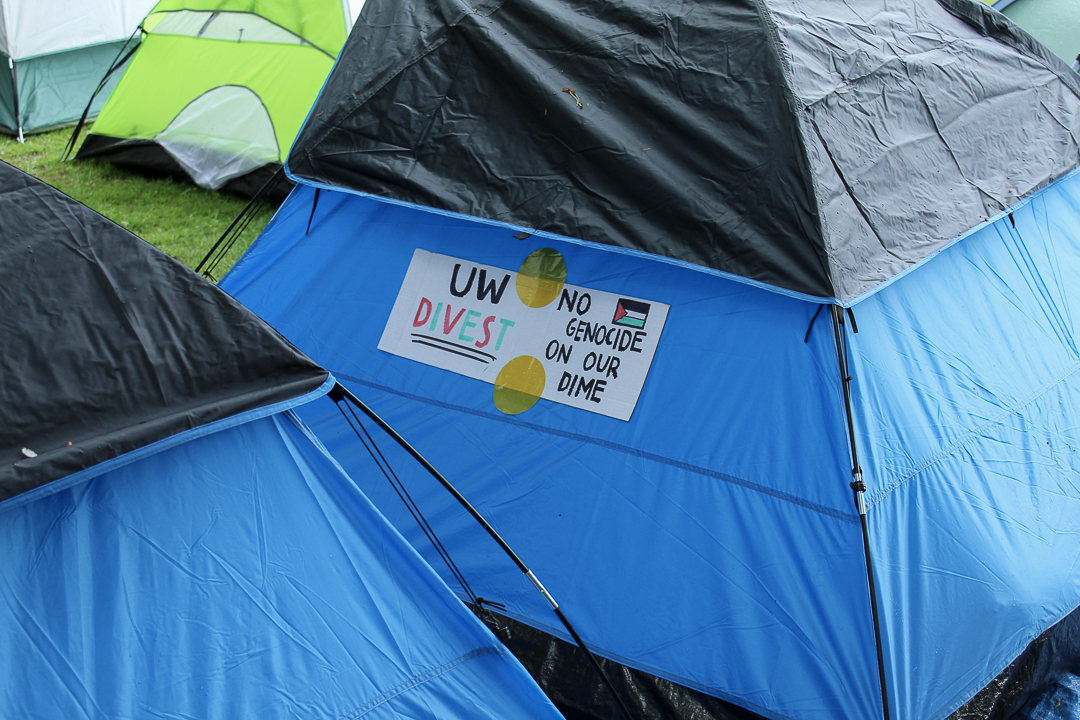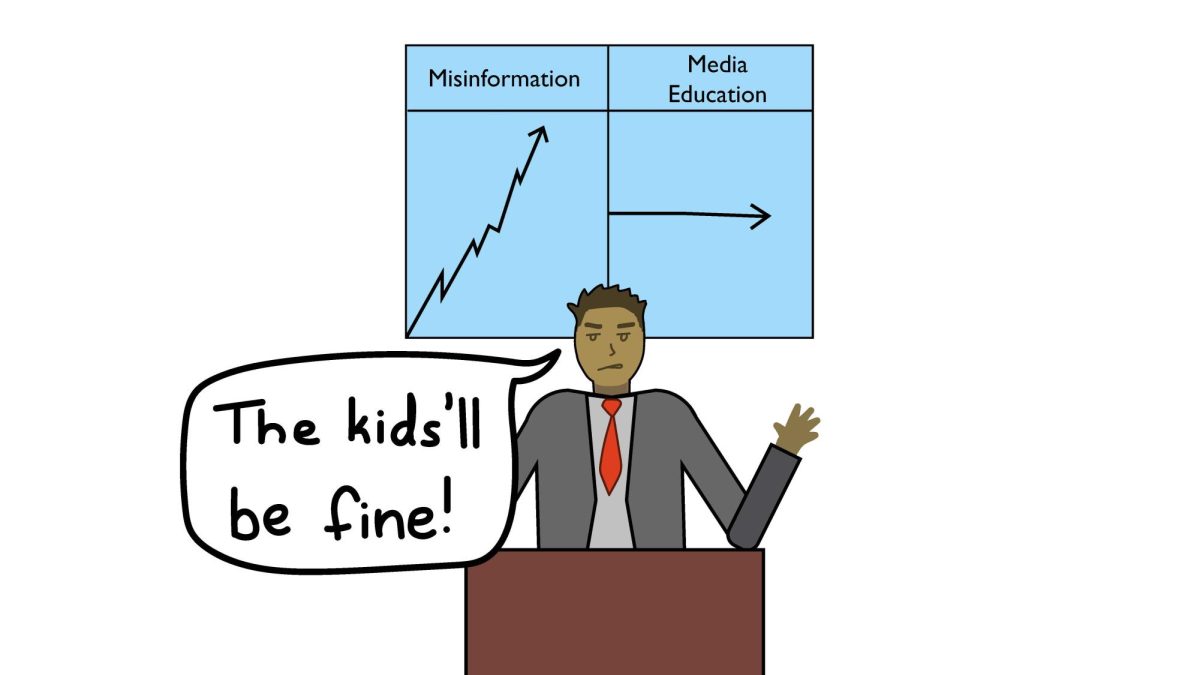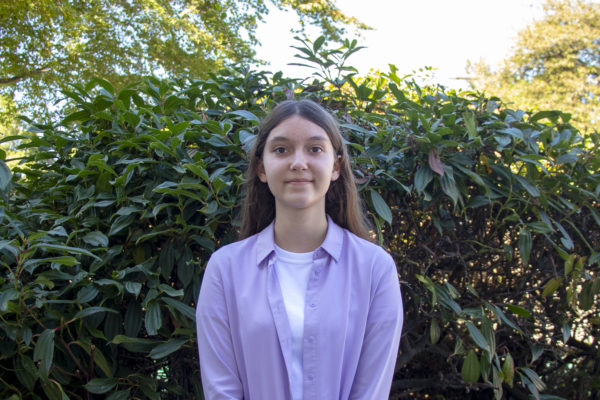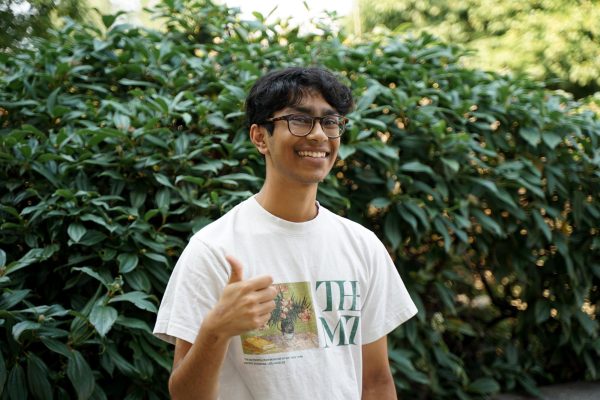In recent weeks, university students across the country have set up encampments on their university campuses in protest of the Israel-Hamas War. Many groups are demanding the same change: that their universities divest from, or stop investing in, companies connected to the Israeli government in light of the rapidly deteriorating humanitarian conditions in Gaza. The most recent iteration of the Israel-Hamas conflict began Oct. 7, 2023, when Hamas militants killed 1,200 Israeli citizens and kidnapped 200 more. In the past seven months, Israeli military campaigns in the Gaza Strip have killed more than 35,000 Palestinians, with 52% being women and children, according to the United Nations. 1.7 million Palestinians have been displaced since the start of the war, with many staying in refugee camps as Israeli forces restrict aid access to the Gaza Strip, including vital medical care, food and water.
Student protesters calling for divestment have stated that their universities are complicit in the genocide of the Palestinian people through their investments in companies connected to the Israeli government, and while protests have grown increasingly prominent, few have led to divestment. It is vital that students raise their voices in support of the Palestinian people, and at some universities, calling for divestment is an effective way to do so. However, the majority of protesters have seen little success due to the intense nature of both the protests and their universities’ responses, which have unintentionally hurt many protesters’ anti-violence sentiments.
To understand the complexity of the situation, it is important to understand divestment. Divestment is when an organization sells its investments or assets. In this case, universities have endowments, or donated funds and assets, which are generally invested in various companies. The returns are used for financial support, research and other means of supporting students and staff. Universities have varying endowment funds, with Columbia University’s sitting at $13.6 billion and Harvard University’s at $50.9 billion as of 2023, according to the National Center for Education Statistics. Many of these universities have committees to determine the sustainability and ethics of their investments, in which students, staff and alumni advise their Board of Trustees, who ultimately decides how to manage their endowment.
The actual process of divestment is much more complicated, since it requires approvals from several levels of university students, faculty and administration. However, universities have successfully divested from various companies in the past, such as Columbia University and its divestment from companies connected with the apartheid South African government. In the early 1980s, Columbia students demanded that the university divest from all companies conducting business with South Africa over its policies promoting apartheid, which is systematic segregation along racial or ethnic lines. The movement gained massive support and Columbia’s student senate agreed to divest, but the Board of Trustees, consisting of various Columbia alumni, declined to do so. After months of demonstration, Columbia finally agreed to divest $39 million dollars — 4% of its investment portfolio at the time — from various companies connected to the South African government. A hundred and fifty five universities followed, including the University of California, Berkeley and New York University. In 1986, the Senate imposed various economic sanctions on South African businesses up until 1992. At first, examples of past successful divestments could offer protesters hope, but the situation is much more complex in the modern day, as divestment becomes more complicated in a modern, more globalized world and protesters tackle the polarizing issue of the U.S government’s support of Israel, compared to its stance against apartheid South Africa.
Compared to the 1980s, complete divestment is incredibly difficult to achieve now. It is nearly impossible to economically cut off an entire government in the 21st century, when economies are extremely globalized and heavily codependent.
Israel remains the largest recipient of U.S foreign aid, having received $216 billion dollars in military aid alone since 1948, according to the U.S Council on Foreign Relations. This has been an important focus of the protests, and by demanding their universities divest, protesters hope to demonstrate their stance against the U.S government’s actions and discourage the government from further aiding Israel. However, protesters remain largely unsuccessful in achieving their goals, as they receive little positive reception from their universities.
The close partnerships between universities and donor companies is another factor that makes divestment a tough demand. Universities often work with large corporations to fund research and academic programs, and will easily prioritize these partnerships over student dissidence. The University of Washington, for example, maintains strong ties with the aerospace company Boeing, which has invested over $100 million into UW programs and is a major employer of UW graduates. However, Boeing has long supported Israel with weapons and other products, with its website stating that it has invested over $3.5 billion dollars into the Israeli economy through an arms agreement, making it a major target of calls for divestment. Shortly after protests at UW began, the university announced it wouldn’t divest from Boeing, because it would lose millions of dollars in funding for academic programs. Although students have every right to raise awareness toward major companies’ connections with Israel, it is impractical in many cases to call for divestment, as it could harm universities and academic opportunities.
Along with large corporations, wealthy donors make up a significant portion of donations. As protests have escalated, some incredibly wealthy donors have announced that they are rethinking their support for universities amidst the situation. Businessman and billionaire Robert Kraft stated he was uncomfortable supporting Columbia University amidst the intense situation on campus, saying he wanted the protests to end immediately. Kraft has donated $8.5 million dollars to Columbia University since 2000. The influence these donors have over universities is much greater than student protesters’ influence, and prevent university administrations from complying with protesters’ demands.
Many universities have not seen enough substantial reasons to consider divestment, and the firm police responses to protests have escalated the situation. According to the Armed Conflict and Event Date Project, a non-profit that tracks political protests globally, 97% of the 553 divestment protests on American college campuses have been peaceful, with less than 20 involving harm to individuals or property. However, several universities, including Columbia, Massachusetts Institute of Technology and University of Arizona, have demanded encampments to disperse, and upon refusal, enlisted the help of the police. ACLED reports that 70 instances of police intervention have led to the use of force, devolving into chaos and violence. Regardless of whether the protesters or police initiated the violence, universities such as Columbia have solidified their positions against divestment, unwilling to negotiate after instances of violence. The violent outcome of these interactions have harmed many protesters’ peaceful stance, with universities viewing them as threats rather than students with reasonable demands.
Similarly, the rise of anti-Semitism and islamophobia have also harmed the protests’ reputation, with universities seeing them as a potential lawsuit rather than reasonable demands as some students have threatened to sue universities, citing the environment on campus. Complaints of anti-Semitism have arisen from students across multiple campuses, not because of the calls for divestment but because of some students who have shown support for Hamas or anti-Semitic imagery and slogans. The University of Minnesota, Emory College and the City College of New York are among several universities in which Jewish students have reported a hostile environment brought about by some protestors. Overall, offensive rhetoric related to the protests has greatly discouraged universities from negotiating over divestment. Instead, administrations have focused on removing any encampments involved and preventing controversy. Whether protests with instances of anti-Semitism have any chance of achieving divestment, the actions of a few students have greatly undermined the argument of many, with some viewing the protests as belligerent rather than reasonable.
Few protests have seen any progress in their demands for divestment. While it is vital that students advocate for causes important to them, the situations surrounding these protests raise questions as to whether or not the protests will result in anything close to divestment. The offensive actions of some students, intense university and police responses, combined with the difficult process of divestment and the various dissidents in positions of power have all contributed to the controversy surrounding many prominent protests. Students should continue to raise awareness to the devastating situation in Gaza, but these factors have greatly undermined their argument for divestment. As the majority of protests have been unsuccessful, it is vital students find other ways to take action, as divestment remains unattainable in this situation.











